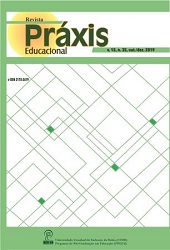NARRATIVES OF WOMEN PRISONERS ON THE TIME LIVED IN THE CARCERARY ENVIRONMENT: BETWEEN CHRONOS AND KAIRÓS
DOI:
https://doi.org/10.22481/praxisedu.v15i35.5683Keywords:
Time, Woman Prisoners, Life of prisonAbstract
The experience of time has been the subject of reflections from Greek philosophers and mathematicians of antiquity to philosophers, anthropologists, physicists and astronomers throughout the development of the sciences. The questions are diverse: does time exist outside of life? Is it linear? Does time have form? How do we attribute meanings to time? This last one is the central question of this article, the result of a research with twenty women imprisoned in a female prison in the city of Recife. The general objective was to understand the meaning and use of time in the chronos dimension and the kairos dimension. The theoretical reference is based on the ideas of many authors, like Agamben (2014), Lévinas (2000), Goofmann (2010) and Foucault (2012). The guiding questions of the research were: do the narratives of women prisoners allow to identify possibilities of life uniting chronos and kairos? How to fill the natural, everyday (chronos), with quality of life (kairós), so that living in prison does not become just a count of days. How do you perceive the relationships and interlacings between past and present tense? The methodology of the research was based on the qualitative approach, prioritized collective and individual interviews during a year. The interpretation of the results was supported by the interpretive phenomenology, with no intention of generalizing results. Women's narratives have expressed the relevance of the school education they receive in prison to re-signify chronos and kairos, as well as the plans for the future they conceive after serving their sentences.












